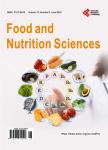The Effect of China’s Family Structure on Household Nutrition
The Effect of China’s Family Structure on Household Nutrition作者机构:Department of Agribusiness and Applied Economics North Dakota State University Fargo ND USA Beijing Food Safety Policy & Strategy Research Base College of Economics and Management China Agricultural University Beijing China Department of Food and Resource Economics University of Florida Gainesville FL USA
出 版 物:《Food and Nutrition Sciences》 (食品与营养科学(英文))
年 卷 期:2019年第10卷第2期
页 面:198-206页
学科分类:1002[医学-临床医学] 100214[医学-肿瘤学] 10[医学]
主 题:Chinese Food Consumption Children Seniors Health Eating Healthy
摘 要:China’s one-child policy has created entitled children or “little kings who are spoiled by their parents and doting grandparents that want to provide the “best food for their child to ensure the future of the family. In addition, seniors’ food preferences may influence the household’s diet. The extended family structure, typically including one child and seniors, will likely affect food expenditures, but does this provide the most nutritious or healthiest diet? Using household data collected from 11 Chinese cities, the results of this study suggest that the presence of a child or seniors, as well as higher income levels, and wife’s education level have significant effects on healthy household food consumption.



